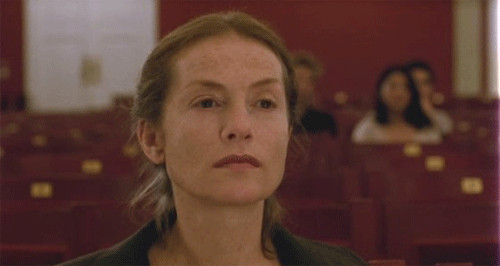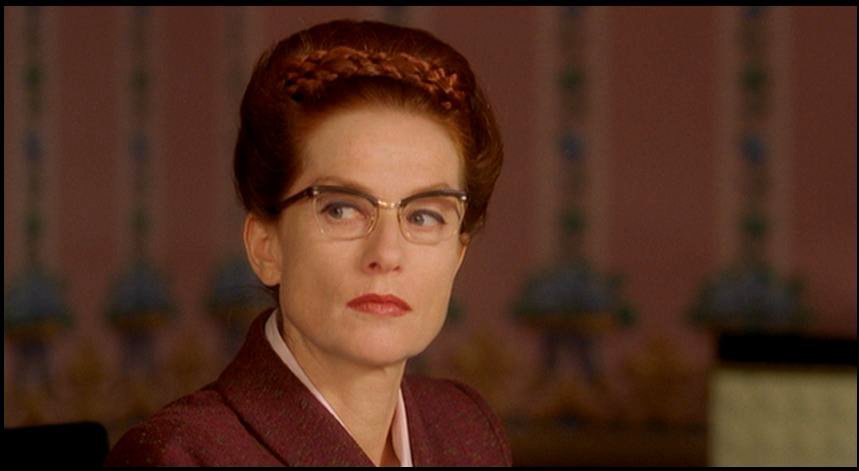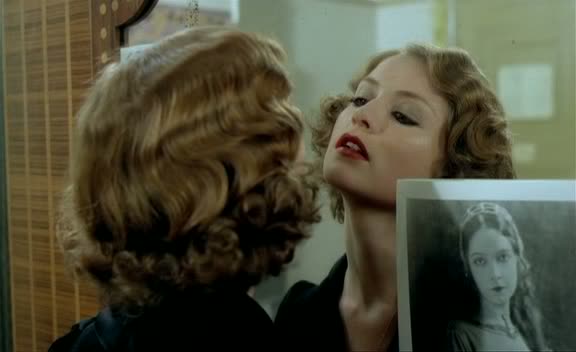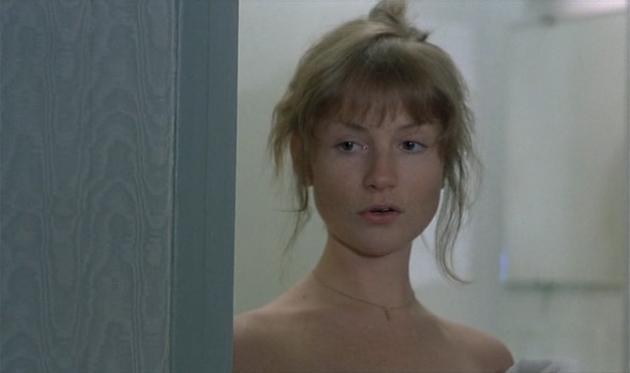
Laurence Olivier was once asked why actors choose such a profession. He replied, “Look at me, look at me, look at me.” Defying that comment, Isabelle Huppert represents the fearless and selfless artistic integrity that should be at the heart of every performer. She challenges herself as much as she challenges audiences.
At over 60 years old, Isabelle Huppert has had a long, celebrated career and is regarded in the highest echelon of French actors. No other actress has been nominated for as many Cesar Awards (the French equivalent of the Academy Awards). She’s also appeared in the most Cannes competition films throughout history with a staggering 22 films. In America, she’s respected but not as well known. While most will point at Meryl Streep as the greatest living actress, it’s Huppert who deserves (or rather, compels) just as much, if not more, attention. For those who truly know her work—she’s a goddess.
Jessica Chastain, for one, has again and again called Isabelle Huppert her idol. When asked why, she replied that Huppert “is always challenging herself. You see her performances, and they’re very brave and very risky and she’s always trying new things with new directors in new countries she’s never worked in before, and that’s exactly the career I want.”
Huppert performs most of her roles from the internal, from an arena of psychological depth and emotional cache. Her characters are usually marked by a certain reticence. But, as ever with the greats, she also has the ability to surprise.
Heaven’s Gate (1980) was Huppert’s U.S. film debut. Unfortunately for her, that film infamously bombed at the box office and bankrupted a vital studio at the time, United Artists. Now, U.S. audiences may recognize her most from indie fare like Hal Hartley’s Amateur (1994) or David O. Russell’s I Heart Huckabees (2004).
Overall, she’s been in about 120 films, consistently and remarkably displaying her talent. This “essential” list is a good start, but there’s a lot more of her work to seek out. White Material (2009), Gabrielle (2005), and Coup de Torchon (1981) are a few that deserve an honorable mention. As for her Top 10…
10. 8 Women (2002, François Ozon)

Ozon’s fancy and flashy musical is a whodunit yarn that takes place inside one family’s mansion. The film is a pastiche of 1950s musicals and melodramas while also parodying the cast’s previous work. One biscuit in the ensemble box is Huppert, who plays the most pursed character. She’s comic—full of anxiety and suggestive body language.
Out of the popularly acclaimed cast, she’s the one that goes through the biggest visual transformation. Huppert would usually play this role inwardly, but here, in Ozon’s theatrical approach, she gives the role broad strokes, curled hysterics, and the element of surprise.
9. In Another Country (2012, Hong Sang-soo)

One of Huppert’s most disarming performances is found in this Korean-produced rom-com. Filmed without a script, the actors had to rely on their improvisational skills and intuitive feeling. Huppert stars in three vignettes, playing three different characters involved with love: the desired, the one motivated by desire, and the one that is hurt by the desire of others.
The film works as an experimental (almost meta-theatrical) showcase of Huppert’s buoyancy and charisma. It’s unlike any of her other performances listed here. She’s delightful and engaged as she flirts, in wonky English, with various Korean men. This is lighter fare but an enjoyable break from her heavy-hitting work and a worthy watch for fans to see what Huppert brings to this droll little project.
8. Violette (1978, directed by Claude Chabrol)

Huppert plays the title character in this true story about an 18-year-old sociopath/murderer. Violette Nozière was a cultural celebrity in 1930s France after killing her father. She made strong allegations against her family, which her mother took umbrage with. Some deemed her as heroic, many considered her scandalous. Chabrol toes the line between her depravity and her purpose.
Huppert embodies this character that’s chiefly concerned with finding love. She walks the streets at night, characteristically promiscuous, but don’t call her a prostitute. She’d refute. Throughout the film, she gives more money to the men then vice versa. At night, when she leaves her quiet bourgeois home, and finds a man to accompany her, she looks unusually bothered. The film is sometimes maddeningly ambiguous but perhaps that’s the point—Chabrol and Huppert want us to feel mixed about her.
Violette is a woman with an air of mystery around her. She’s precocious but not as clever as she thinks. Huppert gazes and kisses her own mirror reflection. She writes fictional love letters to herself as well. Huppert quietly stresses the motivation behind the character: desperate to find someone to love, or else she’ll have to love herself. Except, she can’t even love herself because she feels stifled by her home life. And as ever with narcissism, there are dangerous consequences.
7. La Séparation (1994, Christian Vincent)

Isabelle Huppert and Daniel Auteuil play a couple on the verge of a separation. The relationship’s mainstay is their child, one-year-old Loulou. Autueil gets most of the film’s focus, but he’s essentially a sitting duck, nervously shifting between passive-aggressive contempt and hopeful endearment, as he prepares for the outcome of his girlfriend’s infidelity. He says, “Never two without three.” This could be the quote-totem of the film.
The director smartly leaves the interloping lover out of the film (he’s never seen or even named). Instead, we study Auteuil’s growing impatience and Huppert’s pivotal decision. She adds a lot of depth to a character that could’ve just been the unsympathetic partner of the cuckold.
Huppert gives her character integrity and even though she’s ostensibly guilty, she never comes off as purely selfish. She’s troubled, as well, by their situation—we sense her detachment not due to ego but because she’s boggled in trying to assess the right mode of conduct. Huppert and Auteuil have great chemistry, changing gears effortlessly between vitriol and affection.
6. Loulou (1980, Maurice Pialat)

In tandem with La Séparation (after all, that couple named their kid Loulou), this film navigates the complicated sexual politics of France in the late ‘70s. Huppert plays Nelly, splitting from a bourgeois relationship and moving full-steam-ahead into an affair with an unpredictable drifter, Loulou (played with great zeal by Gerard Depardieu). Pialat’s style is raw and lived-in.
Huppert is the film’s central focus, filled with an equal measure of empathy and passion. She easily forgives her ex-partner for being abusive and gladly becomes the economic pillar between her and Loulou. But Huppert doesn’t play the role as fey. She’s capable of standing up for herself and smart enough to know that her relationship won’t last forever with Loulou. But for now, she’s his helping hand.
In one scene, she accompanies Loulou to his family’s rural estate for a big dinner. Her face goes through a lot without having any dialogue. She’s at first chipper to meet the family, but then coughs/chokes on her drink and food. Nobody pays much attention as her face loses its redness and becomes pale. Spiritlessly, she zones out, with sagging eyes, no longer comfortable in this new environment. But she endures it, at least for now, because of Depardieu’s brawny, but fleeting, appeal.